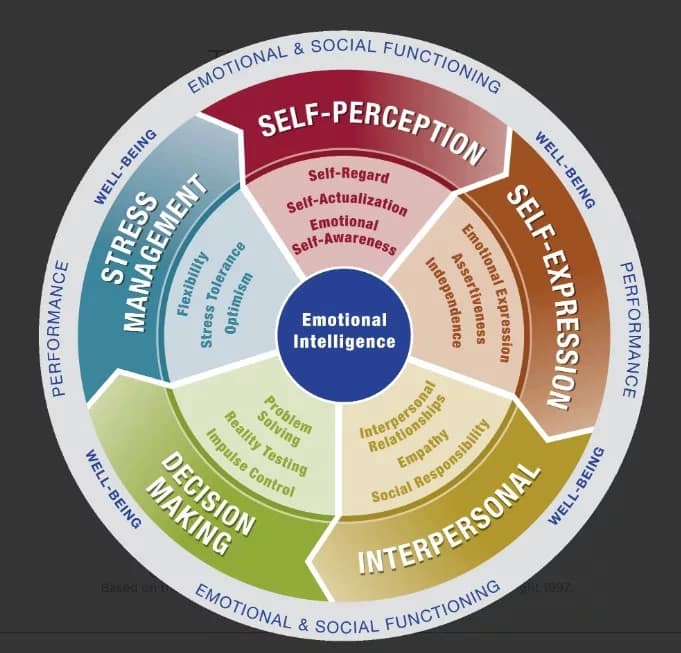
EQI Emotional Quotient Inventory
standardization in the UK
Multi-Health Systems (MHS), based in Toronto, Canada, asked John Rust and his Psychometrics Centre team at City University, London, to carry out a UK adaptation and standardization of the Bar-On Emotional Quotient Inventory, and internationally recognized assessment of emotional intelligence. It is widely used in the USA to measure emotional and social competence. The EQI UK was published by MHS in 2006.
Click for publisher
MHS tasked us with gathering the data to generate a technically excellent UK edition. We used the UK Census 2001 to ensure data represented the UK population. The project involved liaison with more than 200 companies resulting in the collation of responses from over 1000 individuals. Nicky Schlatter from MHS UK commented ““Within a short period of time participants were contacted, sent the assessment and results collected, enabling us to provide UK norms for our Emotional Intelligence tool. This was an efficient and very accommodating service, with constant and consistent contact! “.
EQI: The Bar-On model of emotional intelligence
This model is a comprehensive framework that seeks to explain how individuals understand and manage their own emotions and those of others. Developed by psychologist Reuven Bar-On in the early 1980s and publishe din his PhD in 1985, this model was one of the pioneering attempts to quantify the emotional and social competencies that contribute to a person’s intelligence.
Bar-On introduced the concept of Emotional Quotient (EQ) as a measure of this intelligence, suggesting that EQ is as important as the more traditional Intelligence Quotient (IQ) in determining an individual’s success and well-being. His model is rooted in the understanding that emotional intelligence encompasses a variety of competencies and skills that impact an individual’s ability to cope with environmental demands and pressures.
Bar-On’s five core components of emotional intelligence:
- Intrapersonal Skills: This component focuses on self-awareness and self-expression. It includes emotional self-awareness, assertiveness, independence, self-regard, and self-actualization. These skills enable individuals to understand and express their emotions, establish their identity, and achieve personal goals.
- Interpersonal Skills: This area emphasizes the importance of social awareness and interpersonal relationship management. It covers empathy, social responsibility, and interpersonal relationship skills. These competencies allow individuals to be aware of, understand, and appreciate the feelings of others, fostering healthy and supportive relationships.
- Stress Management: This component addresses how individuals manage emotions related to stress. It includes stress tolerance and impulse control. Mastering these skills helps individuals remain calm and clear-headed under pressure, facilitating effective problem-solving and decision-making.
- Adaptability: This dimension involves being flexible and realistic in adapting to situations. It encompasses problem-solving, reality testing, and flexibility skills. These competencies are crucial for navigating complex and changing environments, making well-grounded decisions, and adjusting one’s emotions and behaviors appropriately.
- General Mood: The final component relates to the overall outlook on life and includes optimism and happiness. This aspect of emotional intelligence reflects the ability to maintain a positive attitude, even in the face of adversity, which is critical for overcoming challenges and achieving success.
The model posits that these components are interrelated and contribute collectively to an individual’s emotional and social functioning. Emotional intelligence is a dynamic set of skills that can be developed and improved over time with practice and training. This perspective highlights the potential for personal growth and the importance of nurturing emotional intelligence for overall well-being and effectiveness in various domains of life.
The development of the Bar-On model was a significant milestone in the field of psychology, opening new avenues for research and application in various contexts, including education, organizational development, and personal growth. It has influenced the design of assessment tools and interventions aimed at enhancing emotional and social competencies, underscoring the critical role of emotional intelligence in achieving a fulfilled and balanced life.
The Bar-On model has garnered attention and sparked debate among researchers and practitioners, contributing to the evolving understanding of emotional intelligence. While some aspects of the model have been challenged and refined through ongoing research, its core premise—that managing one’s emotions and understanding those of others is a key component of intelligence—has had a lasting impact on the field.